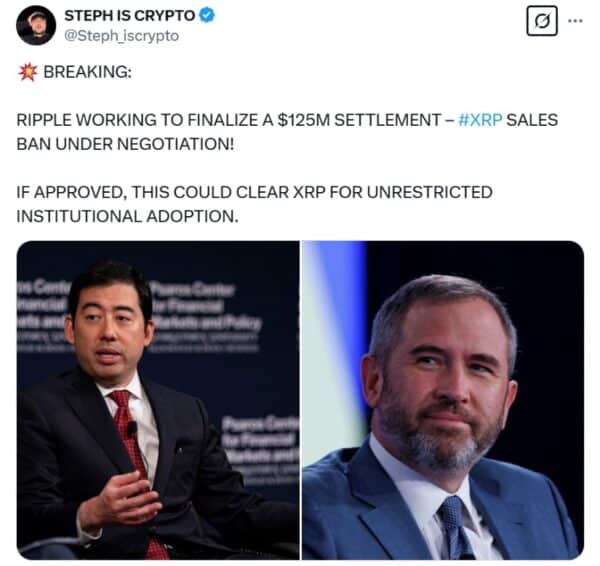Is XRP A Security Or A Commodity? The Ripple Lawsuit And Settlement Implications

Table of Contents
The SEC's Case Against Ripple: Defining a Security
The SEC's lawsuit against Ripple alleges that the company engaged in an unregistered securities offering by selling XRP. The crux of their argument relies heavily on the Howey Test, a legal framework used to determine whether an investment contract qualifies as a security.
The Howey Test and its Application to XRP
The Howey Test establishes four criteria for an investment contract:
- Investment of Money: Investors provided funds to Ripple in exchange for XRP.
- Common Enterprise: The SEC argues that XRP investors were part of a common enterprise, sharing in the profits (or losses) of Ripple's business activities.
- Expectation of Profits: Investors anticipated profits from XRP’s appreciation in value, driven by Ripple's efforts.
- Efforts of Others: Investors relied on Ripple’s efforts to develop and promote XRP to increase its value.
The SEC contends that Ripple's various sales and distribution methods, including programmatic sales, institutional placements, and early access to investors, all point to XRP fulfilling the Howey Test criteria, therefore classifying XRP as a security. They specifically highlight the significant role Ripple played in controlling the XRP market and influencing its price.
Ripple's Defense: Arguing for Commodity Status
Ripple vehemently defends its position, arguing that XRP functions as a decentralized digital currency, operating much like Bitcoin or Ethereum. Their arguments center on the following points:
- Decentralized Nature: Ripple emphasizes that XRP operates on a decentralized, permissionless blockchain, meaning no single entity controls its network.
- Utility and Functionality: They highlight XRP's use in facilitating faster and cheaper cross-border payments, showcasing its practical utility independent of Ripple's actions.
- Market Dynamics: Ripple points to the open and competitive nature of the XRP market, with trading taking place on numerous decentralized exchanges.
They argue that the SEC's interpretation inappropriately conflates the actions of a company with the inherent characteristics of a cryptocurrency. The presence of decentralized exchanges and the open-market nature of XRP trading, they contend, negate the “efforts of others” criteria of the Howey Test.
The Ripple Lawsuit: Key Developments and Outcomes
The Ripple lawsuit has been a protracted legal battle with significant twists and turns.
The Procedural History of the Case
The case's timeline includes:
- December 2020: The SEC files its initial lawsuit against Ripple, its CEO Brad Garlinghouse, and its co-founder Chris Larsen.
- Extensive Discovery Phase: Both sides engaged in extensive discovery, exchanging documents and conducting depositions.
- Summary Judgment Motions: Both sides filed motions for summary judgment, seeking a ruling in their favor without a full trial.
- Judge Analisa Torres' Rulings: Judge Torres issued partial summary judgments, offering crucial insights into the SEC's arguments, notably differentiating between institutional sales and programmatic sales.
These rulings highlighted the complexity of applying existing securities laws to novel technologies like cryptocurrencies.
Potential Settlement Implications
The potential settlement could have profound implications:
- Impact on XRP Price: A settlement favorable to Ripple could significantly boost XRP's price, while an unfavorable outcome could cause a dramatic drop.
- Regulatory Clarity: The outcome will offer valuable precedent regarding the classification of other cryptocurrencies, impacting the regulatory landscape.
- Investor Confidence: The result will influence investor confidence in the cryptocurrency market, affecting investment decisions and market stability.
A settlement could involve Ripple agreeing to certain restrictions on its future XRP sales or paying a significant fine.
The Broader Implications for Crypto Regulation
The Ripple case has far-reaching consequences for the future of cryptocurrency regulation.
The SEC's Approach to Crypto Asset Classification
The SEC's aggressive pursuit of Ripple demonstrates its broader strategy of classifying many cryptocurrencies as securities. This approach has sparked debate within the industry and led to other enforcement actions against crypto projects.
The Future of Crypto Regulation in the US and Globally
The need for clear and consistent regulatory frameworks for digital assets is paramount. The Ripple case highlights the deficiencies in current legislation and the uncertainty surrounding the legal status of many cryptocurrencies. This lack of clarity hinders innovation and investment. Different jurisdictions are approaching crypto regulation in diverse ways, for example, the EU's MiCA framework differs considerably from the SEC's more cautious approach.
Conclusion
The question of whether XRP is a security or a commodity remains at the heart of the Ripple lawsuit, a case with massive implications for the cryptocurrency market. The SEC’s application of the Howey Test, Ripple’s defense emphasizing decentralization, and Judge Torres’ rulings have shaped our understanding of applying traditional securities laws to the innovative world of crypto. The ongoing debate underscores the urgent need for clear regulatory guidelines in the cryptocurrency space. The SEC’s actions and Ripple’s defense have significantly shaped the conversation around digital asset classification and investor protections.
Call to Action: Understanding the classification of XRP – whether it's ultimately deemed a security or a commodity – remains crucial for navigating the crypto market. Stay informed about further developments in the Ripple lawsuit and its potential impact on your investments in XRP and other digital assets. Continue researching and learning about XRP and its legal battles to make informed decisions about your portfolio. Understanding the nuances of XRP’s legal status is essential for every crypto investor.

Featured Posts
-
 Six Nations 2025 A New Dawn For French Rugby
May 01, 2025
Six Nations 2025 A New Dawn For French Rugby
May 01, 2025 -
 Zdravkove Prve Ljubavi Prica O Pesmi Kad Sam Se Vratio
May 01, 2025
Zdravkove Prve Ljubavi Prica O Pesmi Kad Sam Se Vratio
May 01, 2025 -
 France Vs Italy Rugby Match Duponts Impressive Performance
May 01, 2025
France Vs Italy Rugby Match Duponts Impressive Performance
May 01, 2025 -
 Dragons Den Season Premiere Interrupted By Repeat Episode Featuring Closed Business
May 01, 2025
Dragons Den Season Premiere Interrupted By Repeat Episode Featuring Closed Business
May 01, 2025 -
 Duurzame Scholen En De Uitdaging Van Betrouwbare Energievoorziening
May 01, 2025
Duurzame Scholen En De Uitdaging Van Betrouwbare Energievoorziening
May 01, 2025
Latest Posts
-
 Tributes Pour In After Passing Of Dallas Star 100
May 01, 2025
Tributes Pour In After Passing Of Dallas Star 100
May 01, 2025 -
 Dallas Stars Death Reflecting On The 80s Soap Opera Golden Age
May 01, 2025
Dallas Stars Death Reflecting On The 80s Soap Opera Golden Age
May 01, 2025 -
 Dallas Icon Passes Away At The Age Of 100
May 01, 2025
Dallas Icon Passes Away At The Age Of 100
May 01, 2025 -
 The End Of An Era Dallas Star And 80s Soap Legend Passes Away
May 01, 2025
The End Of An Era Dallas Star And 80s Soap Legend Passes Away
May 01, 2025 -
 100 Year Old Dallas Star Passes Away
May 01, 2025
100 Year Old Dallas Star Passes Away
May 01, 2025
